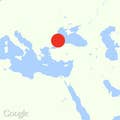
ISTANBUL — A senior Turkish official chose a noisy, out-of-the-way kebab joint to brief a group of international journalists Monday about the bad rap his country is getting in the pro-Moscow media following the downing of a Russian fighter jet in Syria.
That restaurant, Cigeristan, is owned by two brothers, Ali and Ismail Kember, a pair of pious Muslims and ex-musicians ("We are like Cat Stevens," jokes one) who sport beards similar to the ones worn by ISIS fighters. A couple of years ago Turkish president Recep Tayyip Erdogan's son, Bilal, ate at the busy eatery, and the proud owners posed for pictures with him.
Those photos have since resurfaced as part of Russia's "evidence" that Turkey has been colluding with ISIS leaders amid escalating rhetoric between Moscow and Ankara after Turkey shot down the plane.
"All the claims about Turkey and ISIS [should be taken as] seriously as this allegation," said the official, who spoke on condition of anonymity because he was not authorized by the government to speak to the public — despite organizing the fast-food fete.
Turkey's profile has risen tremendously in recent months. It has become a crucial country in the war against ISIS in Syria and Iraq and a key nation in the transit of extremists from Europe into jihadi strongholds and hundreds of thousands of refugees seeking sanctuary from a deadly, complicated war zone.
Recep Tayip Erdogan's son "BILAL ERDOGAN" with his ISIS brothers #StopTurkeySuppportOfISIS
Once praised as a model of Muslim prosperity and democracy, Turkey now finds itself increasingly under the spotlight for its fraying human rights record, its alleged ties to jihadi groups in Syria, and its encroachments in the affairs of other countries. This weekend, a furor erupted after the government in Baghdad strenuously protested the deployment of around two dozen tanks and additional troops at bases in Iraq where Turkey has used to train more than 2,300 Iraqi Kurds fighting ISIS for the last 20 months.
"No permission was given from Baghdad," Iraq's ambassador to the U.S., Lukman Faily, said during an online discussion Monday moderated by BuzzFeed News. "Disregard for territorial integrity only weakens the coalition against [ISIS]."
Over juicy kebabs and spicy salads, the senior Turkish official sought to present Ankara's point of view on the recent controversies, assuring journalists that it had obtained permission from Baghdad for the training mission, and had only bolstered the number of tanks as a "force protection" measure to guard the trainers in the face of ISIS attacks.
"All of this is taking place with the knowledge of the central government [in Baghdad]," he said. "That's why their reaction was so surprising."
The Turkish official sought to counter charges in pro-Russian and Western leftist circles that Turkey has been profiting from ISIS oil smuggled across the Syrian and Iraqi borders, noting that Ankara had boosted laws against trafficking of petroleum products and reduced fuel the amount of fuel caught coming across the border illegally from 21 million gallons in 2014 to 300,000 in the first 10 months of 2015. It deploys some 20,000 of its 50,000 border guards along the 550-mile Syrian border.
He noted that despite claims that Turkey looked the other way at the rise of ISIS, it had been the victim of more than 20 ISIS attacks that have claimed more than 160 lives. What's more, the frequency of the attacks has gone from about one every two or three months in 2014 to one a month in 2015.
Still, many accuse Turkey of directing its military efforts to fighting the Kurdistan Workers Party, or PKK, the outlawed Kurdish militant group that has been fighting the Turkish government for 40 years, instead of ISIS. Officially the Turkish government regards both ISIS and PKK as equally menacing terrorist threats. The Turkish official conceded that in recent months it has launched far more airstrikes against the PKK than ISIS, in part because, while a global coalition hammers away at ISIS, only Turkey focuses on the PKK, said the official. More than 40,000 people have died in Turkey's decades-long with the PKK.
But the official also conceded domestic political considerations played a role in the decision to place the PKK, an old-fashioned leftist group that only seeks autonomy for Turkey's long-oppressed Kurdish minority, on the same level as ISIS, a messianic global jihadi group seeking to establish an Islamic empire from the Straits of Gibraltar to southeast Asia.
"PKK is limited with Turkey obviously, but that doesn't reduce the suffering of those who lost their lives (fighting the PKK)," said the official. "Otherwise I cannot persuade my citizens that the fight against (ISIS) is a sincere fight, when some people are trying to create legitimacy for the PKK."

